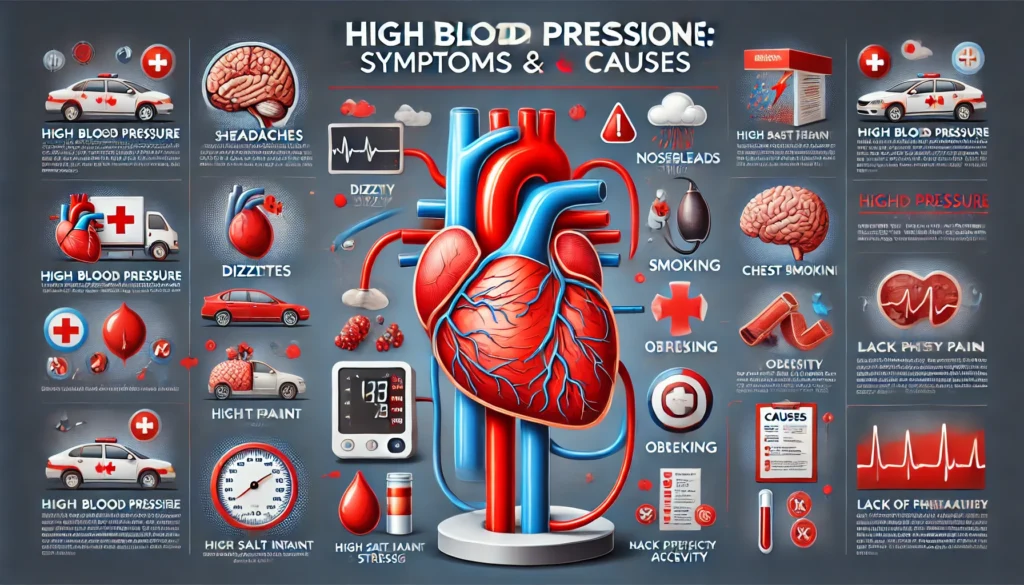
What is High Blood Pressure?
High blood pressure, also known as hypertension, is a chronic medical condition in which the force of blood against the walls of the arteries is consistently too high. Blood pressure is measured in millimeters of mercury (mmHg) and is expressed as two numbers: systolic pressure (the pressure when the heart beats) over diastolic pressure (the pressure when the heart rests between beats). A normal blood pressure reading is typically around 120/80 mmHg. Hypertension is diagnosed when readings consistently exceed 130/80 mmHg.
Hypertension is often called the “silent killer” because it usually has no noticeable symptoms but can lead to severe health complications such as heart disease, stroke, kidney failure, and vision loss if left untreated. It is a global health concern, affecting over 1 billion people worldwide, and is a leading risk factor for cardiovascular diseases.
Causes of High Blood Pressure
High blood pressure can be classified into two types based on its cause:
- Primary (Essential) Hypertension: This type has no identifiable cause and develops gradually over time. It accounts for about 90-95% of all hypertension cases. Risk factors include:
- Genetics: A family history of hypertension increases the risk.
- Age: Blood pressure tends to rise with age.
- Obesity: Excess weight puts additional strain on the heart and blood vessels.
- Sedentary Lifestyle: Lack of physical activity contributes to poor cardiovascular health.
- Unhealthy Diet: High salt, fat, and sugar intake can elevate blood pressure.
- Stress: Chronic stress can temporarily or permanently raise blood pressure.
- Alcohol and Tobacco Use: Excessive alcohol consumption and smoking are significant risk factors.
- Secondary Hypertension: This type is caused by an underlying condition or medication. It tends to appear suddenly and cause higher blood pressure than primary hypertension. Common causes include:
- Kidney disease
- Hormonal disorders (e.g., Cushing’s syndrome, hyperthyroidism)
- Sleep apnea
- Certain medications (e.g., birth control pills, decongestants)
- Illegal drugs (e.g., cocaine)
Symptoms of High Blood Pressure
High blood pressure is often asymptomatic, especially in its early stages. However, in severe cases or during a hypertensive crisis (when blood pressure exceeds 180/120 mmHg), symptoms may include:
- Severe headaches
- Fatigue or confusion
- Vision problems
- Chest pain
- Difficulty breathing
- Irregular heartbeat
- Blood in the urine
- Pounding in the chest, neck, or ears
Because symptoms are rare, regular blood pressure monitoring is crucial for early detection and management.
Progression of High Blood Pressure
If left untreated, high blood pressure can lead to serious health complications over time. The progression typically involves:
- Damage to Arteries: High pressure causes the arteries to become less elastic, reducing blood flow and oxygen delivery to organs.
- Heart Disease: Hypertension forces the heart to work harder, leading to conditions like coronary artery disease, heart attack, and heart failure.
- Stroke: Damaged arteries in the brain can burst or become blocked, causing a stroke.
- Kidney Damage: High blood pressure can narrow and harden the blood vessels in the kidneys, impairing their function.
- Vision Loss: Hypertension can damage the blood vessels in the eyes, leading to retinopathy.
- Cognitive Decline: Reduced blood flow to the brain can contribute to dementia and memory problems.
Medical Treatment for High Blood Pressure
The treatment of hypertension depends on its severity and underlying causes. Common medical treatments include:
- Lifestyle Modifications: These are the first line of defense and include:
- Reducing salt intake
- Eating a heart-healthy diet (e.g., DASH diet)
- Exercising regularly
- Losing weight
- Quitting smoking and limiting alcohol
- Medications: If lifestyle changes are insufficient, doctors may prescribe medications such as:
- Diuretics: Help the kidneys remove excess sodium and water.
- ACE Inhibitors: Relax blood vessels by blocking the formation of a natural chemical that narrows them.
- Beta-Blockers: Reduce the heart rate and the heart’s workload.
- Calcium Channel Blockers: Relax the muscles of blood vessels.
- ARBs: Block the action of a natural chemical that narrows blood vessels.
- Regular Monitoring: Patients with hypertension should regularly monitor their blood pressure and attend follow-up appointments with their healthcare provider.
Natural Treatment for High Blood Pressure
In addition to medical treatments, natural remedies can help manage blood pressure. These should complement, not replace, prescribed treatments. Natural approaches include:
- Dietary Changes:
- Increase potassium-rich foods (e.g., bananas, spinach, avocados) to balance sodium levels.
- Incorporate magnesium-rich foods (e.g., nuts, seeds, whole grains) to support blood vessel health.
- Eat dark chocolate or cocoa in moderation, as flavonoids can improve blood flow.
- Herbal Remedies:
- Garlic: Known to lower blood pressure by relaxing blood vessels.
- Hibiscus Tea: Contains antioxidants that may reduce blood pressure.
- Hawthorn: An herb that supports cardiovascular health.
- Physical Activity:
- Engage in moderate exercise like walking, swimming, or yoga for at least 30 minutes a day.
- Stress Management:
- Practice mindfulness, meditation, or deep breathing exercises to reduce stress.
- Limit Caffeine: Excessive caffeine can temporarily raise blood pressure.
Prevention of High Blood Pressure
Preventing hypertension involves adopting a healthy lifestyle and addressing risk factors. Key preventive measures include:
- Maintain a Healthy Weight: Losing even a small amount of weight can significantly lower blood pressure.
- Eat a Balanced Diet: Focus on fruits, vegetables, whole grains, lean proteins, and low-fat dairy.
- Reduce Sodium Intake: Aim for less than 2,300 mg of sodium per day (ideally 1,500 mg for those with hypertension).
- Exercise Regularly: Aim for at least 150 minutes of moderate-intensity exercise per week.
- Limit Alcohol: Drink in moderation (up to one drink per day for women and two for men).
- Quit Smoking: Smoking damages blood vessels and raises blood pressure.
- Manage Stress: Find healthy ways to cope with stress, such as hobbies or relaxation techniques.
- Regular Check-Ups: Monitor blood pressure regularly, especially if you have risk factors.
Conclusion
High blood pressure is a common but serious condition that requires proactive management to prevent life-threatening complications. By understanding its causes, symptoms, and progression, individuals can take steps to control their blood pressure through lifestyle changes, medical treatments, and natural remedies. Prevention is key, and adopting a heart-healthy lifestyle can significantly reduce the risk of developing hypertension. Regular monitoring and collaboration with healthcare providers are essential for maintaining optimal blood pressure levels and overall health. Remember, managing high blood pressure is not just about adding years to your life but also adding life to your years.
